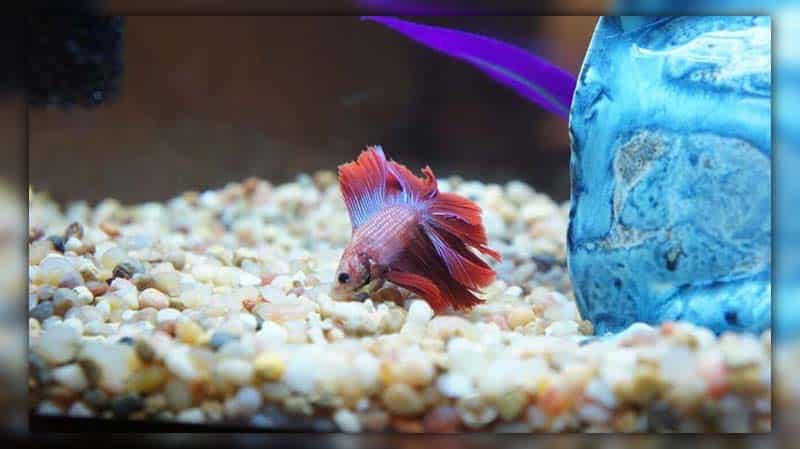Fish, like all animals, bettas need rest to grow and stay healthy. In this article, National Park Aquarium will provide you with information about betta sleep patterns, how they sleep, when they sleep, and for how long.
Do Betta Fish Sleep?
All fish, including bettas, sleep. They rest in a state of low metabolism. Most of their brain functions cease, but they remain capable of responding to imminent threats. Bettas have a specialized organ for sensing water movement and vibrations, which can alert the sleeping fish to any impending danger.
How Do Betta Fish Sleep?
When bettas sleep, they remain still with their eyes open, as they lack eyelids. Eyelids play a crucial role in lubricating the eyeball in many terrestrial animals, but when you live underwater, lubrication is always around you.
Bettas may lose color when they sleep (a natural defense mechanism) and they can sleep in various positions: curled up like a cat, tilted to one side, or even standing upright with their heads down.
While bettas typically sleep flat or tilted, they can occasionally sleep upside down. Various sleeping positions are normal. However, continuous upside-down swimming could be a sign of swim bladder disorder.

How Long Do Betta Fish Sleep Each Day?
Bettas sleep for about 12-14 hours daily. They may be considered light sleepers, but they are nocturnal and require a lot of darkness to sleep. Bettas’ sleeping behavior also includes taking naps during the day.
So, if you notice your fish not moving, don’t panic: “If your betta sleeps for about 12 to 14 hours each day, including short daily naps, that’s normal and sufficient for them to stay healthy.”

When Do Betta Fish Sleep?
Bettas typically sleep at night when it’s dark. However, some betta owners notice their bettas resting continuously and become worried. Others don’t see their fish taking any daytime naps.
It’s important to realize that each betta can behave very differently. Some take a rest during daylight hours, some may only do so at night, and others do both.
So, don’t worry if you occasionally see your betta lying at the bottom of the tank. If he seems healthy, he’s probably just taking a nap.
Similarly, don’t worry if your betta seems to be always active. He will rest when needed, possibly at night when you’re also sleeping. You might catch him sleeping if you look into the tank when the lights are off.

Where Do Betta Fish Sleep In A Tank?
Bettas really enjoy sleeping on large flat leaves, such as the betta leaf hammocks that are commonly available in most pet stores.
1. Betta Fish Sleep on The Bottom of The Tank
Betta fish predominantly choose the lower part of the tank for sleep, whether your tank has sand or gravel. However, if your betta stays near the bottom after resting, it could indicate stress. This behavior might result from avoiding strong filter currents or seeking the right water temperature.
2. Betta Fish Sleep at The Top of The Tank
Betta fish sleep at the top of the tank, especially when making bubble nests, waiting for food, or taking in atmospheric oxygen. But continuous hovering at the top might indicate stress or illness.
3. Hiding Places
Bettas feel secure when they have hiding spots away from other fish and tank mates. To promote security, bettas require diverse hiding spots and good companions. Consider artificial aquarium plants if maintaining live ones isn’t your preference.
Source: More Palmer Aquatics
Do Betta Fish Hibernate?
Bettas do not hibernate, so it would be alarming if you notice your fish not moving for extended periods. Bettas have a tightly regulated sleep schedule and will have a fixed number of sleep hours both day and night, regardless of the season. But the fact is, bettas do not hibernate under any conditions.
How To Tell If A Betta Fish Is Sleeping Or Dead
To determine if a betta fish is sleeping or dead, you can observe the following signs:
- Breathing: Even when sleeping, bettas should be seen drawing water in through their mouth and out through their gills. If your betta has stopped breathing, it’s likely dead.
- Coloration: A sleeping betta will retain its vibrant colors, while a dead fish may appear dull or pale.
- Fins: If the fins of your betta are tightly held against their body, it’s often an indication of stress.
- Position in the tank: If your fish is lying motionless at the bottom of the tank or upside down, it’s likely dead.
- Response to stimuli: You can gently tap on the side of the tank and observe the response. If the betta remains motionless, it may be dead.

Why Do Bettas Sleep a Lot and How to Stop It?
Bettas sleep a lot due to several reasons such as stress, illness, cold water, boredom, and dim lighting. They require longer rest periods than many other pet fish due to their long, ornate fins which take a lot of energy to pull through the water. However, excessive sleep can impact their health adversely.
- Check the water quality: High ammonia levels can cause your betta to sleep a lot.
- Feed your betta the right amount and type of food: Digestive issues can lead to excessive sleep.
- Provide a dark and quiet environment for them to sleep: Bettas are light sleepers and may take short naps during the day.
- Maintain the day-to-night cycle: Your fish will sleep when it is dark, so an appropriate photoperiod with light and dark cycles is critical to all indoor tanks.
- Provide favorable living conditions and stimulating activities: This can keep them active.
Conclusion
Through this article, you’ve learned do betta fish sleep and how they do so.. Bettas typically sleep at night in various positions at the bottom of the tank or on plant leaves.
If your betta is sleeping too much, it’s not a good sign. Observe and find ways to make your betta happier or seek help from an expert.




